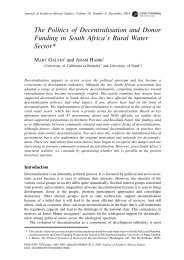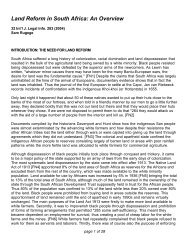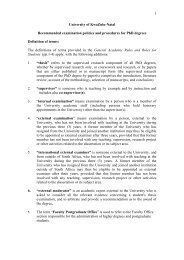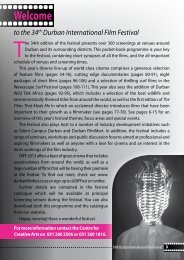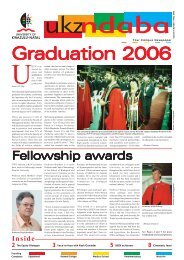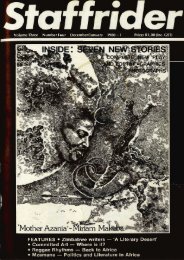Staffrider Vol.6 No.2 1985 - DISA
Staffrider Vol.6 No.2 1985 - DISA
Staffrider Vol.6 No.2 1985 - DISA
Create successful ePaper yourself
Turn your PDF publications into a flip-book with our unique Google optimized e-Paper software.
TALKING STORYWhat this delayed recognition achieves is quite significant.By means of a dramatic device we are reminded that thestoryteller, while he certainly draws on personal experience,does so only to the extent that this experience can be offeredto others, or can be shared by them. He is at once the subjectof the story and a part of the community to whom and bywhom it is told (a many-sided communication which isfundamentally different from the two-way writer-readertraffic of the novel). Babel's brief demonstration of thenature of storytelling serves a related function whichconfirms the democratic bias of the storytelling medium: apre-eminent man is a fit subject for a story providing he andhis audience are able to recognize the ordinary man in him,too. (This may, of course, be false modesty in Pavlichenko,but the story soon refutes that suspicion.)This storytelling milieu within which the storytellerinvites the participation of the community is, however, afictional construction within what remains a written tale, aliterary production determined by the medium of printedbooks and commodity distribution. Consequently we have toask not only 'What is the relationship between teller andlistener?' but also 'What literary purpose does the depictionof this relationship serve?' I believe that Babel provides, inthis fashion, a demonstration of the mode of attention herequires from his readers.One proof of this is the degree of identification presentin the story between Babel and Pavlichenko the storyteller(the emphasis is necessary because a strong measure of whatNdebele called 'the kind of tense ambiguity which makes forreading enjoyment' underlies Babel's presentation ofPavlichenko the man and his actions.) Since this pointdepends on a reading of all Babel's stories, and particularlythose in which he reflects — usually obliquely — on thenature of his art, I shall deal briefly with the story'Awakening' before returning to the presentation of thestoryteller in 'The Life and Adventures of Matthew Pavlichenko'.As the title implies, 'Awakening' evokes that period inyouth when the world and one's place in it are clerarlyperceived for the first time. The narrator, a boy of fourteen,is under pressure from his parents to become an infantprodigy on the violin (Odessa, where the story is set, 'in thecourse of ten years or so . . . supplied the concert platformsof the world with infant prodigies'.) Rather like Vukani inNdebele's 'The Music of the Violin', he resists his parents'ambitions and takes to wandering around the harbour whenhe should be having his violin lessons. There he meets aremarkable man:This was Yefim Nikitich Smolich, proof-reader of theOdessa News. In his athletic breast there dwelt compassionfor Jewish children, and he was the god of a rabble ofrickety starvelings. He used to collect them from thebug-infested joints on the Moldavanka, take them downto the sea, bury them in the sand, do gym with them,dive with them, teach them songs. Roasting in theperpendicular sunrays, he would tell them tales aboutfishermen and wild beasts. To grown-ups Nikitich wouldexplain that he was a natural philosopher. The Jewishkids used to roar with laughter at his tales, squealing andsnuggling up to him like so many puppies. The sun wouldsprinkle them with creeping freckles, freckles of the samecolour as lizards.The boy is already beginning to write his first pieces, but itis the influence of the 'natural philosopher' that provesdecisive:'Now what is it you lack? Youth's no matter — it'll passwith the years. What you lack is a feeling for nature.'He pointed with his stick, at a tree with a reddish trunkand low crown.'What's that tree?'I didn't know.'What's growing on that bush?'I didn't know this either. We walked together acrossthe little square on the Alexandrovsky Prospect. The oldmankept poking his stick at trees; he would seize meby the shoulder when a bird flew past, and he made melisten to the various kinds of singing.'What bird is that singing?'I knew none of the answers. The names of trees andbirds, their division into species, where birds fly away to,on which side the sun rises, when the dew falls thickest —all these things were unknown to me.'And you dare to write! A man who doesn't live innature, as a stone does or an animal, will never in all hislife write two worthwhile lines. Your landscapes are likedescriptions of stage props. In heaven's name, what haveyour parents been thinking of for fourteen years?'This initial preoccupation with nature as a practical matterabout which information is to be sought, in order to 'livein nature, as a stone does or an animal' points to the practicalorientation of storytellers towards life in general which isnoted by Walter Benjamin. When Pavlichenko recalls thatphase of his youth when 'life brought stripes to his shoulderstraps' we learn not only of his martial background but alsoof his view of experience as a teacher. At the end of hisstory he produces the formulation which marks him out asa storyteller whose project is in parallel with that of hiscreator, as it is with the 'natural philosophy' of the proofreaderof the Odessa News. 'You see, I want to get to knowwhat life really is, what life's like down our way.'Pavlichenko the ManIf Babel can be identified with Pavlichenko the storyteller,his attitude to Pavlichenko the man is another matter. In thephrase used by Ndebele to describe the endings of Kemal'sstories, Babel is another storyteller who 'leaves us thinking'.Each reader must bring a unique experience to bear in orderto draw conclusions from Pavlichenko's life. A story whichcontains unqualified celebrations of life lived to the fullalso admits ironies such as that which attends the reading of'Lenin's letter'. Yet the controlling principle of the workdoes not lie in a finely tuned moral judgement to which allaspects of the strong must be referred. It lies, rather, in thestoryteller's recognition of the energy source in his material,and in his commitment to allowing that energy unimpededexpression, discovering in the process the fierce logic ofPavlichenko's life. 'Let me give you a story', storytellersoften say. The gift, well and truly delivered by a master ofthe art, is to allow us to hear another 'voice of experience'.It is easy, after all, to pass judgements for or against theburning of bodies in blockaded, contested streets. What thestoryteller can give us is the truth such judgements conceal:the truth that resides in 'what life's like down our way'.Note1. His essay, The Storyteller, was mentioned by NjabuloNdebele in his introduction to Yashar Kemal, It is publishedin Illuminations (Jonathan Cape, London, 1970).46 STAFFRIDER, VOL. 6 NO. 2, <strong>1985</strong>




